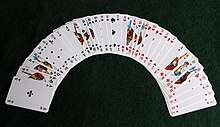Letzter Stich
Letzter Stich is a card game for 3 or 4 players in which the aim is solely to win the last trick. It originated in Germany and the names mean "last trick" respectively. A game of this name is mentioned as early as 1839.[1] In 1967, Gööck describes it as being suitable for children, yet having a "surprising wealth of interesting game situations."[2] It should not be confused with Letzter, a reverse game where the aim is to lose the last trick and which has additional complexities.
 French-suited 32-card pack used in Letzter Stich | |
| Origin | Germany |
|---|---|
| Type | Plain-trick game |
| Family | Last Trick group |
| Players | 3-6 |
| Age range | 6+ |
| Cards | 32 |
| Deck | Piquet |
| Play | Clockwise |
| Card rank (highest first) | A K Q J 10 9 8 7 or A 10 K Q J 9 8 7 |
Rules
These rules are based on Gööck, but Feder, Müller and Reichelt are virtually identical.[3][2][4][5]
The aim is to win the last trick. The game is played with a French-suited Skat pack. Gööck and Müller cite an Ace-Ten ranking, Feder and Reichelt use the natural ranking. With three players, the Eights are removed and each player is dealt 8 cards; otherwise if four play, each is dealt 7 cards; if five play, 6 cards and if six play, 5 cards. Any remaining cards are put to one side and not used in the game.
Forehand leads any card to the first trick. There are no trumps. Players must follow suit. The winner of a trick leads to the next.
The winner of the last trick scores an agreed number of points e.g. 10, 20 or 50 and the first to reach a pre-agreed target is the overall winner.
References
- Weber 1839, p. 114.
- Gööck 1967, p. 42.
- Feder 1980, p. 50.
- Müller 1994, p. 53.
- Reichelt 1987, p. 58.
Literature
- _ (1875). Sächsische Dorfzeitung: Anzeiger für Stadt und Land.Volume 37.
- Feder, Jan (1980). Die schönsten Kartenspiele: Über 100 Variationen mit dem Skatblatt. 2nd edn. Droemersche Verlagsanstalt Th. Kanur Nachf., Freising. ISBN 3-426-07628-4
- Gööck, Roland (1967). Freude am Kartenspiel, Bertelsmann, Gütersloh.
- Müller, Reiner F. (1994). Die bekanntesten Kartenspiele. Neff, Berlin. ISBN 3-8118-5856-4
- Reichelt, Hans (1987). Kartenspiele von Baccara bis Whist. Englisch, Wiesbaden. ISBN 3-88140-313-2
- Weber, Karl Julius (1839). Democritos oder hinterlassene Papiere eines lachenden Philosophen, Volume 6. Hallberger'sche Verlag, Stuttgart.
External links
- Letzter Stich at www.casinospiegel.net. Online rules.